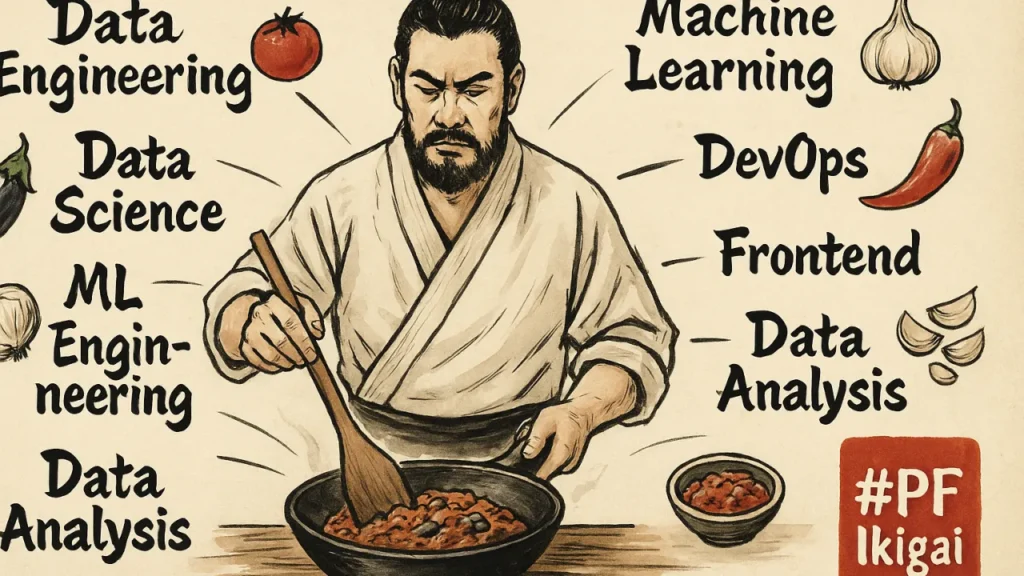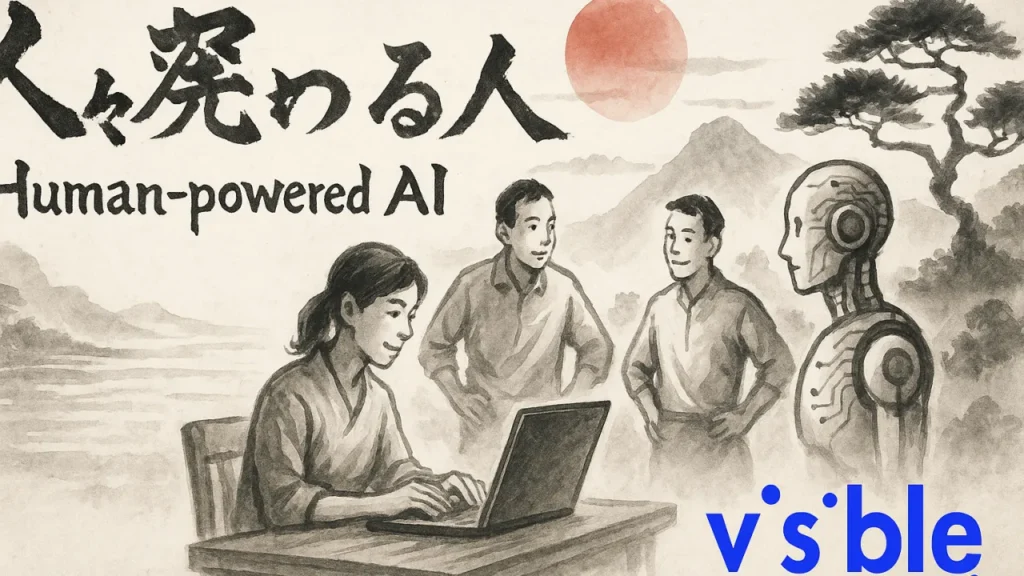Tech Writers at PF
AI tools have become indispensable for developers and tech professionals seeking to stay competitive and efficient. The right AI assistants can dramatically boost your productivity, enhance code quality, and help you solve complex problems faster.
In this article, I’ll share five game-changing AI tools that deserve a place in every tech professional’s toolkit in 2025. Whether you’re writing code, conducting research, or troubleshooting complex systems, these tools will transform how you work.
1. DeepCode: Your AI Code Review Partner
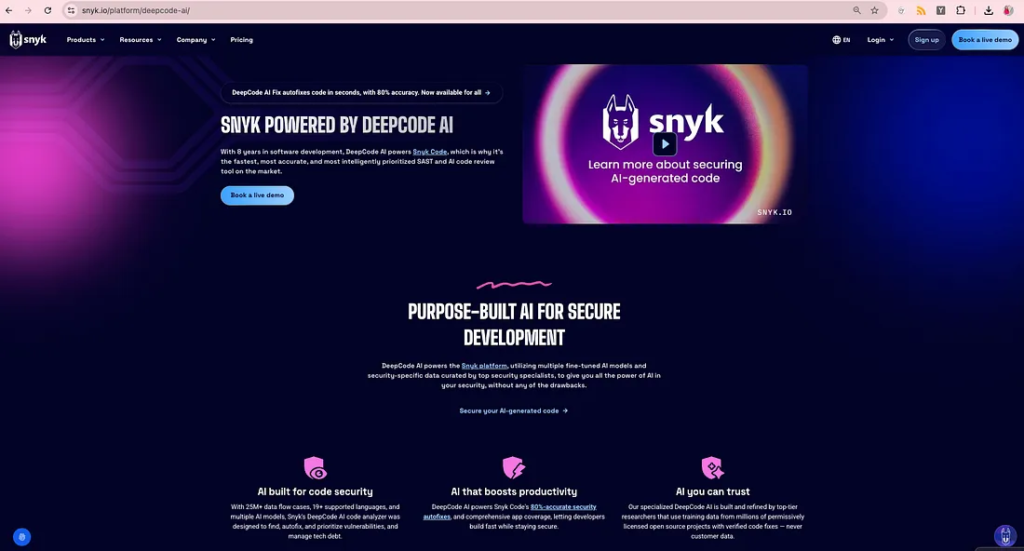
Every engineer knows the importance of code reviews, but what if you had an AI assistant that could review your code 24/7, catching bugs and vulnerabilities before they reach production?
DeepCode is exactly that — an AI-powered code review tool that analyzes your code against patterns learned from millions of repositories to identify potential issues with remarkable accuracy.
What sets DeepCode apart:
- Contextual understanding: Unlike simple linters, DeepCode understands your code’s purpose and context, providing relevant suggestions.
- Multiple integrations: Works seamlessly with GitHub, GitLab, and Bitbucket.
- Multi-language support: Covers JavaScript, TypeScript, Python, Java, C/C++, and more.
- Educational feedback: Not only identifies issues but explains why they are problematic and how to fix them.
When DeepCode flags a potential memory leak or security vulnerability, it does more than just highlight the problem; it explains the underlying issue and suggests specific fixes. This educational aspect helps developers improve their skills over time, not just fix isolated issues.
For teams striving for higher code quality or developers looking to level up their skills, DeepCode offers both immediate value and long-term learning benefits.
GitHub Link — https://github.com/DeepCodeAI
Official Website — https://snyk.io/platform/deepcode-ai/
2. GitHub Copilot: Your AI Pair Programmer
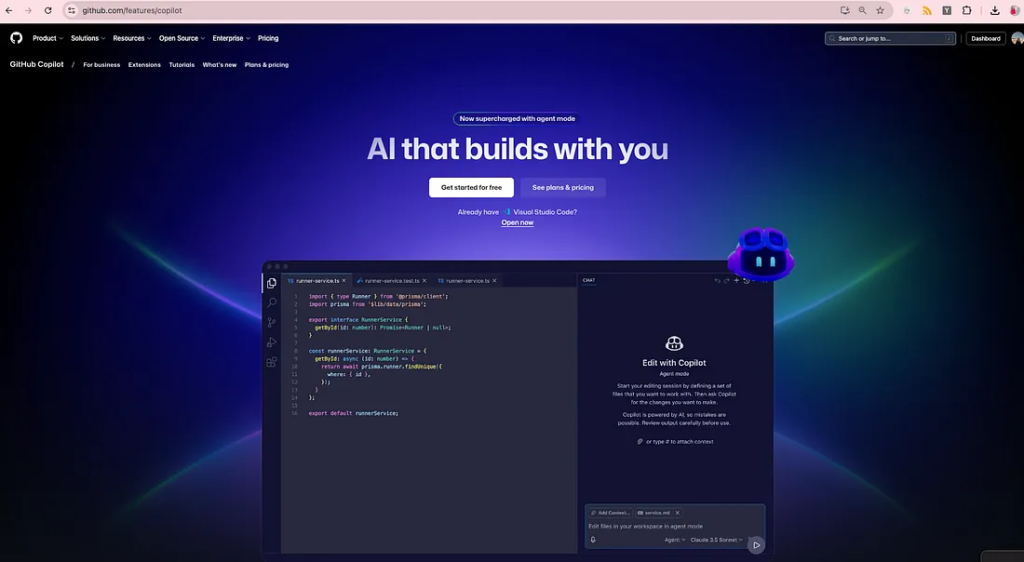
GitHub Copilot has revolutionized how code gets written. Trained on billions of lines of public code, this AI pair programmer suggests whole functions, blocks of code, and even entire algorithms based on context and comments.
What makes Copilot extraordinary:
- Context-aware suggestions: Understands your project and offers relevant code snippets.
- Comment-to-code: Write a comment describing what you want, and Copilot generates the implementation.
- Multi-language proficiency: Works across dozens of programming languages and frameworks.
- Adaptive learning: The more you use it, the better it aligns with your coding style.
Copilot shines when handling boilerplate code, standard patterns, or algorithms you are less familiar with. For example, implementing a sorting algorithm or setting up API routes becomes dramatically faster.
While Copilot is not perfect, it occasionally suggests deprecated approaches or imperfect solutions, but it serves as an incredible starting point that you can refine. The time savings are substantial, often reducing hours of work to minutes.
Link — https://github.com/features/copilot
3. Tabnine: The Privacy-Focused Code Assistant
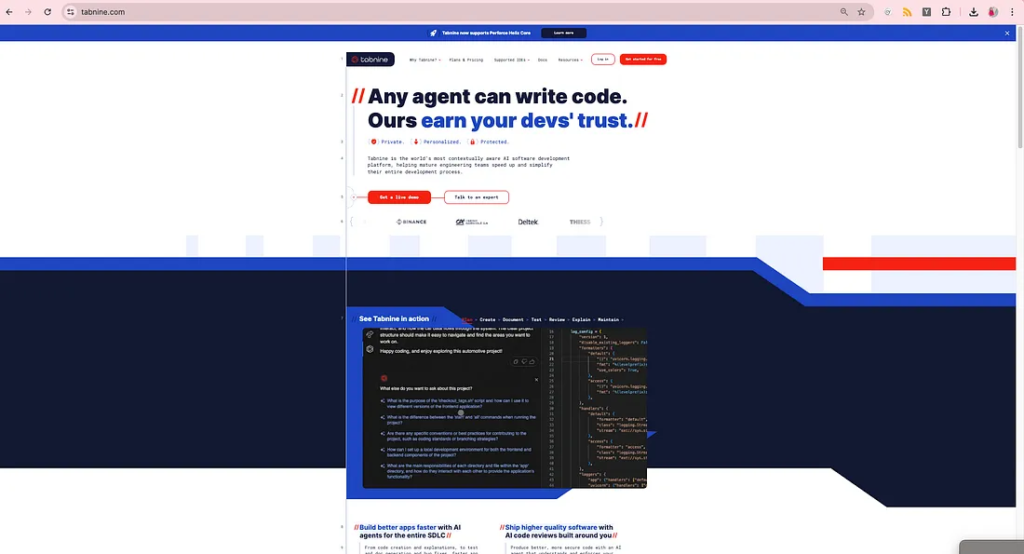
For engineers concerned about code privacy or working in environments with strict security requirements, Tabnine offers AI-powered code completion with a crucial difference: it can run entirely locally on your machine.
Why Tabnine stands out:
- Privacy first: Choose between cloud-based and local AI models.
- Cross-IDE support: Works with VS Code, JetBrains IDEs, and virtually all major IDEs.
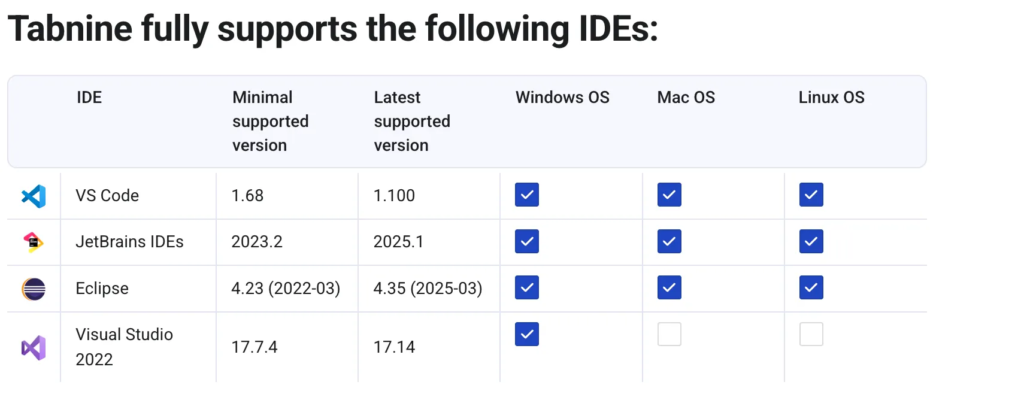
- Personalized suggestions: Learns your coding patterns to provide increasingly relevant completions.
- Team models: The Enterprise version allows teams to train models on their private codebases.
Tabnine is particularly valuable for teams working on proprietary code or in regulated industries where data privacy concerns might otherwise limit AI adoption. Its ability to learn from your specific codebase means suggestions become increasingly aligned with your team’s conventions and patterns.
While perhaps not as comprehensive as Copilot for generating entire functions from scratch, Tabnine excels at understanding your code context and providing highly relevant completions that match your style.
Link — https://www.tabnine.com/
4. Perplexity: Your AI Research Assistant
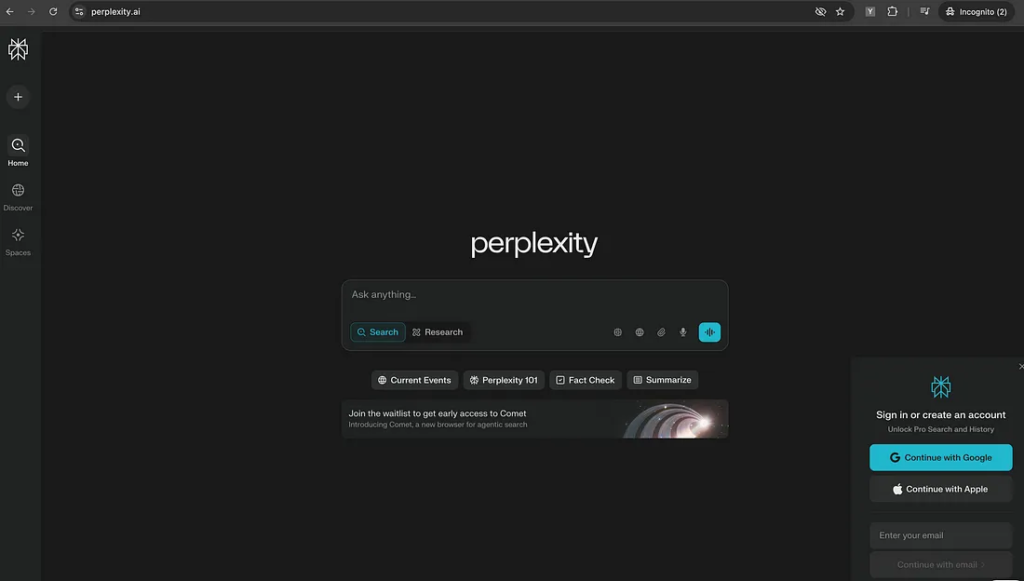
Technical work requires constant research, learning new technologies, debugging mysterious errors, and staying updated on best practices. Perplexity transforms this research process with an AI-powered search that delivers comprehensive answers rather than just links.
What makes Perplexity essential:
- Direct answers: Provide complete responses rather than forcing you to piece together information from multiple sources.
- Cited sources: Backup information with references you can verify.
- Technical depth: Understands complex technical queries and provides nuanced explanations.
- Follow-up capability: Explores related topics and anticipates additional questions.
When researching how to implement a specific feature or troubleshooting an error message, Perplexity can save hours by synthesizing information from documentation, academic papers, forums, and other sources into coherent, comprehensive explanations.
It gives you a complete explanation with trade-offs, use cases, and code examples, all properly cited so you can dig deeper if needed.
Perplexity effectively functions as your research assistant, dramatically reducing the time spent gathering and synthesizing information from disparate sources.
Link — https://www.perplexity.ai/
5. Claude: Your Versatile AI Problem-Solver
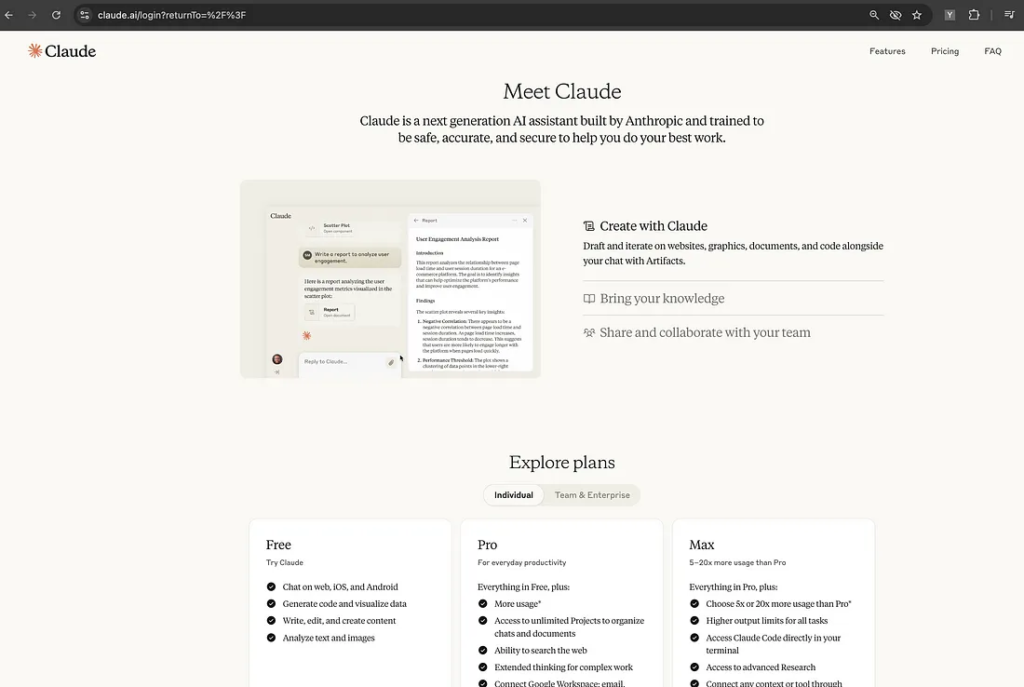
While the previous tools excel at specific tasks, Claude by Anthropic offers versatile assistance across the entire spectrum of technical work. This conversational AI assistant can help with everything from explaining complex concepts to debugging code and drafting documentation.
Claude’s standout capabilities:
- Deep technical knowledge: Understands programming languages, frameworks, algorithms, and systems.
- Step-by-step explanations: Breaks down complex topics into easy to understand summaries or processes.
- Code translation: Helps port code between different languages or frameworks.
- Documentation assistance: Generates clear technical documentation or specifications.
- Conceptual clarity: Excels at explaining difficult concepts through analogies and examples.
Claude is particularly valuable when you are working with unfamiliar technologies or need to quickly understand complex systems. Having a conversation with Claude about a difficult concept often leads to “aha” moments that might take hours to reach through traditional research.
For example, you might ask Claude to explain intercept in Cypress or draft API documentation based on your code. The ability to have a back-and-forth conversation allows for a depth of understanding that’s difficult to achieve with traditional resources.
Link — https://claude.ai/login?returnTo=%2F%3F
These five AI tools complement each other beautifully across the development lifecycle:
- Research phase: Begin with Perplexity to understand approaches and best practices
- Implementation: Use GitHub Copilot or Tabnine to accelerate coding
- Verification: Run DeepCode to catch potential issues
- Problem-solving: Engage Claude when you hit roadblocks or need a deeper understanding
- Documentation: Use Claude to help document your work
Together, they address different aspects of technical work, creating a comprehensive AI-powered workflow that enhances productivity at every stage.
The Future of AI in Development
These tools mark the start of AI revolutionizing how technical work gets done. As these systems continue to evolve, we can expect even deeper integration into development workflows, with AI assistants that:
- Understand larger codebases as complete systems
- Generate entire applications from high-level specifications
- Autonomously identify and implement optimizations
- Provide increasingly personalized assistance based on individual developer patterns
However, these tools will enhance human engineers’ capabilities rather than replace them entirely. The most successful tech professionals will be those who learn to effectively collaborate with AI assistants, using them to handle routine tasks while focusing their expertise on creativity, system design, and complex problem-solving.
Conclusion
The five AI tools we’ve explored — DeepCode, GitHub Copilot, Tabnine, Perplexity, and Claude represent a new paradigm in technical work. By intelligently delegating specific tasks to these specialized assistants, you can dramatically increase your productivity, improve code quality, and focus your attention on the most creative and challenging aspects of development.
👉 Want more posts like this on AI?
Follow ABAutomationHub on YouTube or connect with me on LinkedIn!



